1. Vessel-Related Charges
– Tonnage Dues: Based on GT (Gross Tonnage) as per Shiogama Port Authority tariff. Rates vary by vessel size and type.
– Port Dues: Charged per entry or stay, calculated by GT. Refer to official port tariff for exact rates.
– Pilotage (Shifting) Fees: Mandatory for vessels over 500 GT. Fees depend on vessel length and draft.
– Tugboat Fees: Required for maneuvering. Calculated by tugboat horsepower and usage time.
– Berthage Fees: Charged per hour or day based on vessel length and berth type.
– Mooring/Unmooring Fees: Fixed fee per operation, varying by vessel size.
– Light Dues: Included in port dues for navigation aids maintenance.
– Quarantine Fees: Standard fee per inspection by Japan Quarantine Office.
– Clearance Fees: Administrative charge for customs processing.
– Barge Hire: For cargo operations, charged per barge and hour.
– Hatches Opening/Closing: Labor cost per hatch.
– Trimming Fees: For bulk cargo, based on volume and labor.
– Oil Boom Fees: Mandatory for oil tankers, charged per deployment.
2. Service Charges
– Garbage Disposal: Fixed fee per cubic meter (official Shiogama Port rates apply).
– On/Off Hire Survey: Negotiated with surveyors, typically hourly/daily rate.
– Fumigation: Required for certain cargoes, charged per compartment.
– Launch Service: For crew transfers, per trip or hourly.
– Firefighting: Standby charges if required (rare).
– ISPS Charges: Fixed fee per vessel call for security compliance.
– Freshwater Supply: Per ton, plus service fee.
– Bunkering: Fuel/oil supply via third-party providers (market rates).
– Shore Power: If available, per kWh usage.
– Sludge/Waste Oil Disposal: Per ton, licensed contractors only.
– Ship Agency Fees: Typically 0.1-0.3% of total disbursements (negotiable).
– Tallying Services: Per ton or hour for cargo operations.
3. Crew and Miscellaneous
– Crew Expenses: Local transport/medical costs (if applicable).
– Post/Telecom: Usage-based (e.g., pilot SIM cards).
– Miscellaneous: Unforeseen minor expenses (receipts required).
4. Cargo-Related Charges
– Cargo Dues: Per ton (import/export), varies by cargo type.
– Stevedoring: Labor cost per ton/hour.
– Stowage/Trimming: For bulk cargo, per ton.
– Storage: Daily fee per ton/pallet after free period.
– Lighterage: If using barges, per ton/mile.
– Tally Fees: Optional for detailed cargo checks.
– Warehouse/Yard Usage: Daily rental fee per square meter.
– Domestic Passenger/Tourist Vessel Fees: Special rates apply (check port circulars).
5. Additional Potential Charges
– Overtime Labor: For operations outside standard hours.
– Special Permits: If handling hazardous materials.
– Weather Delays: Possible additional berthage if forced to stay.
– Customs Inspection: Additional fees if random checks occur.
6. Cost Control Tips
– Pre-arrange services (tugs/bunkers) to avoid spot premiums.
– Minimize idle berth time to reduce berthage.
– Consolidate waste disposal to lower per-unit costs.
– Verify all invoices against port tariff (available at Shiogama Port Office).
– Use agent’s local knowledge for fee exemptions/discounts.
– Optimize cargo operations to reduce stevedoring overtime.
– Negotiate bundled service packages with providers.
7. Official References
– Shiogama Port Authority website (verify latest tariffs).
– Japan Ministry of Land, Infrastructure, Transport and Tourism (MLIT) port regulations.
– Customs and quarantine fee schedules published by respective agencies.
– International Ship and Port Facility Security (ISPS) Code compliance documents.
– Japan Coast Guard navigational aid fee structure.
8. Compliance Notes
– All fees subject to change per annual port authority revisions.
– Foreign vessels must comply with Japan’s Foreign Vessel Special Measures Law.
– Environmental fees (waste/oil disposal) follow Japan’s Pollution Control Standards.





